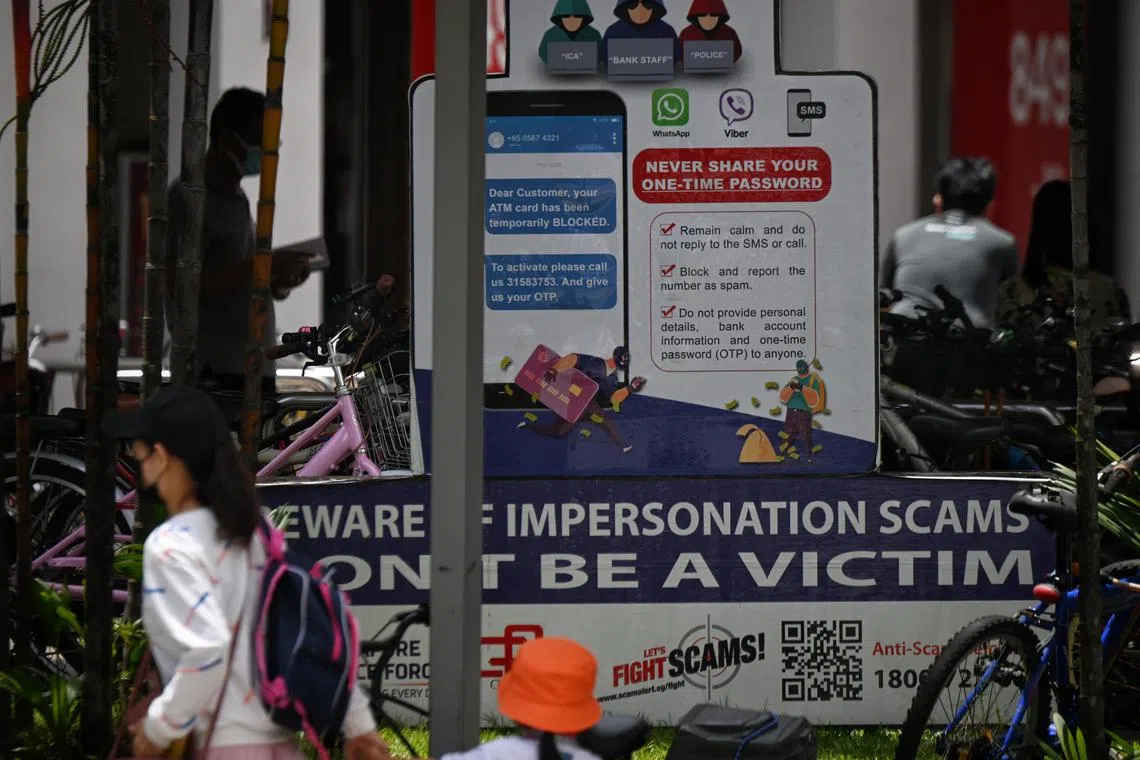Man in his 60s loses $50,000 after scammer claiming to be his ‘kampung friend’ asks to borrow money
Sign up now: Get ST's newsletters delivered to your inbox

The victim transferred money to the scammer twice, and would have done it a third time if not for the intervention of bank staff, who recognised it as a scam.
ST PHOTO: KUA CHEE SIONG
Follow topic:
SINGAPORE - He received a phone call from an unknown number from someone claiming to be his friend from his kampung days, decades ago.
But the man, who is in his 60s, did not know he was talking to a scammer.
When his “friend” asked to borrow money, citing financial problems, the man was more than willing to help and, on two occasions, transferred more than $50,000 to the scammer.
He even went to his bank to transfer money a third time, but alert bank employees recognised he had fallen for a scam and blocked the money transfer.
The case was told to The Straits Times by Mr Jeffery Chin, deputy director of the Scam Public Education Office (Speo) on Thursday.
Launched earlier in 2023, Speo aims to drive public education efforts on scams and produce consistent anti-scam messages across various platforms to keep the public informed.
Mr Chin met members of the media to highlight Speo’s role in Singapore’s fight against scams.
He said there have been more fake friend call scam cases in recent month
He added: “It is concerning because it has been ingrained in many of us to try to be helpful to our friends when we can, but unfortunately, scammers are leveraging that.”
Mr Chin explained that fake friend call scams typically involve a scammer calling a victim from an unknown number and pretending to be his friend.
The scammer would ask the victim questions such as, “Can you guess who I am?” and “You can’t remember me?”. The victim would reply with the names of friends he believes could be the caller. The scammer would then pretend to be one of the friends mentioned and claim to have lost his mobile phone or changed his contact number.
Said Mr Chin: “The victim may feel bad for forgetting his ‘friend’. So when the scammer calls again a couple of days later and claims to be in serious need of help, the victim may still feel guilty about forgetting his friend and be more obliged to help.”
In 2020, there were no reported fake friend call scams. But in 2021, there were 686 such cases, and this figure jumped 207 per cent to 2,106 cases in 2022.
The fake friend call scam was the fifth type of scam of concern in 2022, with victims losing at least $8.8 million that year.
It seems to be getting worse. In March, the police warned of the persistent trend of this scam,

Scam Public Education Office deputy director Jeffery Chin said there have been more fake friend call scam cases in recent months, and this rising trend was troubling.
ST PHOTO: KUA CHEE SIONG
Mr Chin said the public should always be suspicious when they receive such calls, or when contacted on social media by people who claim to be an old friend.
He said: “Your first reaction may be to feel bad because you thought you forgot your ‘friend’. But take a moment and be calm. It is always useful to try to contact that particular friend via other channels or at their original number to verify that it is really them.”
According to the weekly scam bulletin posted on the Singapore Police Force’s Facebook page, fake friend call scams have been the top trending scam in the past two months.
Mr Chin said this bulletin, which was launched in March, is to educate the public about scams to be cautious about, the modus operandi of each scam type, and how not to fall for them.
He added: “With the increasing number of scam cases, there is a need to raise awareness of different types of scams.
“Thus, we believe a dedicated agency like the Speo will help to drive efforts to send out coherent and consistent anti-scam messages to the public.”



